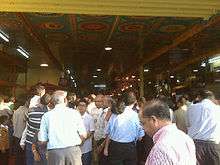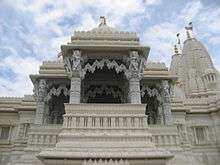Hinduism in Canada
| Total population | |
|---|---|
|
497,200 (2011) 1.45% of the Canadian Population | |
| Regions with significant populations | |
| Ontario · British Columbia · Quebec · Alberta | |
| Languages | |
| English · French · Punjabi · Gujarati · Tamil · Indian Languages |
|
Part of a series on
 |
Hindus in Canada generally come from one of three groups. The first is primarily made up of Indian immigrants who began arriving in British Columbia about 110 years ago and continue to immigrate today (Hindus from all over India immigrate to Canada today, but the largest Indian subgroups are the Gujaratis and Punjabis). This group also includes some immigrants from Fiji, Guyana, Trinidad & Tobago, and Suriname, who are of Indian descent. The second major group of Hindus immigrated from Sri Lanka, going back to the 1940s, when a few hundred Sri Lankan Tamils migrated to Canada. The 1983 communal riots in Sri Lanka precipitated the mass exodus of Tamils with over 500,000 finding refuge in countries such as Canada, UK, Australia, Germany, France and Switzerland from then Sri Lankan Tamils have been immigrating to Canada in particular around Toronto and Greater Toronto Area. A third group is made up of Canadian converts to the various sects of Hinduism through the efforts of the Hare Krishna movement, the Gurus during the last 50 years, and other organizations.
According to the Canada 2011 Census, there were 497,960 practitioners of Hinduism.[1]
Hindu population
| Historical population | ||
|---|---|---|
| Year | Pop. | ±% |
| 1981 | 69,505 | — |
| 1991 | 157,015 | +125.9% |
| 2001 | 297,965 | +89.8% |
| 2011 | 497,965 | +67.1% |
| Year | Percent | Increase |
|---|---|---|
| 2001 | 0.96% | - |
| 2011 | 1.45% | +0.49% |
The Hindu Population in Canada according to the 2011 National Household Survey.[1]
| Province | Hindus 2001 | % 2001 | Hindus 2011 | % 2011 |
|---|---|---|---|---|
| 217,560 | 1.9% | 366,720 | 2.9% | |
| 31,495 | 0.8% | 45,795 | 1.0% | |
| 15,965 | 0.5% | 36,845 | 1.0% | |
| 24,525 | 0.3% | 33,540 | 0.4% | |
| 3,835 | 0.3% | 7,720 | 0.6% | |
| 1,590 | 0.2% | 3,570 | 0.3% | |
| 1,235 | 0.1% | 1,850 | 0.2% | |
| 470 | 0.1% | 820 | 0.1% | |
| 400 | 0.1% | 635 | 0.1% | |
| 30 | 0.0% | 205 | 0.1% | |
| 10 | 0.0% | 165 | 0.5% | |
| 60 | 0.2% | 70 | 0.2% | |
| 10 | 0.0% | 30 | 0.1% | |
| 297,200 | 1.0% | 497,965 | 1.5% |
Early Hindus
Early Hindus maintained their religious traditions in mostly hostile environment which viewed the so-called colored immigrants as a threat to the British culture and way of life of the time. These male pioneers could not marry brides from India up until the 1930s, and did not have the right to vote in Federal elections until 1947. Religious life was centered around homes and Bhajans organized by community members.
Hindu converts

Since the 1960s many westerners attracted by the world view presented in Asian religious systems including Hinduism have converted to Hinduism. Canada was no exception. Many native born Canadians of various ethnicities have converted during the last 50 years through the actions of ISKCON, Arya Samaj and other missionary organizations as well as due to the visits and guidance of Indian Gurus such as Guru Maharaj, Sai Baba, the controversial Rajneesh and others.
Later immigrant Hindus
Due to the liberalization of Canadian immigration policies many Hindus from India, Pakistan, Bangladesh, Sri Lanka, Mauritius, Fiji, Trinidad, Guyana and Eastern African nations such as Kenya, Uganda and Tanzania along with South Africa have arrived in the metropolises of Montreal, Toronto, Calgary and Vancouver.. In last 20 years many Hindus from Nepal have migrated to Canada. It is estimated that approximately 8000 to 10000 Nepalese Hindus are residing in Canada with their main concentration in Toronto, Calgary, Vancouver, Edmonton and Montreal. Canada government has pledged to resettle 6500 Bhutanese Refugees of Nepalese ethnicity by 2012. More than 6000 Bhutanese Nepali, also called lhotshampa have already settled in Canada by September 2014. Majority of Bhutanese Nepali are Hindus.
Temple societies
These communities have formed over 1000 temple societies across the country that essentially functions community organizations. Some of these associations also have established private schools in Tamil to compete with non-religious and Catholic school boards that most Hindu students go to.
One among the earliest hindu temples in Canada was established in rural Nova Scotia, in Auld's Cove, near the border to Cape Breton Islands, in 1971. Hindu Sanstha of Nova Scotia was formed by some 25 families living in the area at the time. Lord Krishna is primary deity, and indian community families from Sydney, Antigonish, New Glasgow, and even Halifax often assemble together to celebrate hindu festivals. Temple welcomes everyone, people of different faith and culture, to participate in the festivals, in a growing multi-cultural population of the region.
The largest Hindu temple in Canada is BAPS Shri Swaminarayan Mandir Toronto . It consists of two separate buildings, one of them being the mandir itself and the other being the Haveli, home to a large Sabha Hall, several religious bookstores, a small prayer room, the country's largest Indo-Canadian museum, a water fountain and a large gymnasium. It is the only Mandir built using Hindu traditions. It took $40 million to build and opened in 2007, surpassing Hindu Sabha Temple in nearby Brampton, which held the old record. The entire mandir is 32,000 sq ft (3,000 m2).
Organizations
There are several organizations representing the Hindu community in Canada. Among them the Hindu Canadian Network[2][3] is the most prominent umbrella organization. Hindu Youth Network is currently the largest Hindu youth movement in Canada with 6000+ registered members and over 80% of the Hindu student groups in the country under its umbrella. Others include the Hindu Sabha temple, and the World Maha Hindu Organization, a cultural organization.
See also
References
- 1 2 "2011 National Household Survey". www12.statcan.gc.ca. Statistics Canada. Retrieved 21 April 2016.
- ↑ "THE BELINDA STRONACH FOUNDATION | Tony Blair and Belinda Stronach Join in collaboration with Canadian faith and belief leaders". Newswire.ca. 2008-12-05. Retrieved 2012-07-26.
- ↑ Archived September 7, 2009, at the Wayback Machine.

